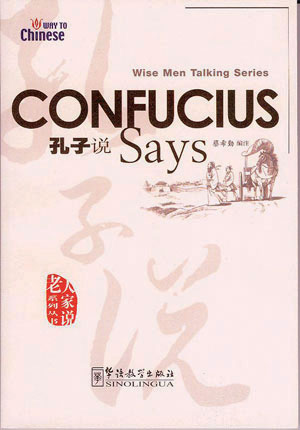'Wise Men Talking' Series
 0 Comment(s)
0 Comment(s) Print
Print E-mail China.org.cn, April 12, 2012
E-mail China.org.cn, April 12, 2012
By Cai Xiqin
145*210mm
Publisher: Sinolinhua
The Wise Men Talking Series includes the following 10 titles, Confucius Says, Mencius Says, Lao Zi Says, Sun Zi Says , Zhuang Zi Says, Mo Zi Says, Guan Zi Says, Yan Zi Says and Han Fei Zi Says.
This series faithfully records the wisdom of these learned men who came from the various ancient schools of Chinese philosophy. Explanatory notes and English translations have been added to the texts for the benefit of readers who are interested in traditional Chinese culture.
As the saying goes,"If an old dog barks, he gives counsel." Old men, who walk more roads, eat more rice, read more books, have more experiences, enjoy more happiness, and endure more sufferings, are experienced and knowledgeable, with rich life experience. Thus, what they say is mostly wise counsel, and young people should listen to them.
The Spring and Autumn (770-476 BC) and Warring States (475-221 BC) periods of Chinese history were a golden age for ancient Chinese thought. In those periods, various schools of thought, together with many sages whose names bore the honorific suffix "Zi," emerged and contended, including the Taoist school, Confucian school, Mohist school, school of Logicians, Legalist school, Military school and Yinang school. Numerous and well known, these schools of thought were as brilliant as the Milky Way.
Later representatives of these schools of thought flocked to the Jixia Academy of the State of Qi. Duke Xuan of Qi was an enlightened ruler, famous for making an ugly but brilliant woman his wife. The duke provided board and lodging, as well as government subsidies for experts and scholars coming to give lectures, and never inquired about their backgrounds. For those willing to hold official positions, the duke appointed them guest officials, built mansions for them and paid them high salaries. Those unwilling to take up official posts were kept on as advisors. This was an era when "one hundred schools of thought contended and a hundred flowers blossomed." The scholars debated in forums, and wrote books to expound their doctrines:
Some preached benevolence; some, righteousness; some, inaction; some, absolute freedom; some, aversion to offensive war; some, attack by stratagem; some, the goodness of mans nature; some, the evil nature of man. Some said that relatives were not relatives; some said that horses were not horses; some urged the importance of knowing oneself and ones enemy; some said that benevolence knew no enemy .... And they left behind many splendid classic works of scholarship.
Unfortunately, this situation did not last long. When Qin Shihuang (reigned 221-210 BC) united all the states of China, and ruled as the First Emperor, his prime minister, Li Si, ordered that all books except those on medicine, fortune telling and tree planting be burned. So, all poetry collections and the classics of the various schools of thought were destroyed. Emperor Wu (reigned 140-88 BC) of the Western Han Dynasty made Confucianism the orthodox doctrine of the state, while other schools of thought, including the Taoist and Legalist schools, were deemed heretical.
These other schools, however, managed to survive, and an abundance of their classical works have been handed down to us. These classical works contain many wise sayings and profound insights into philosophical theory which are still worthy of study today. We have compiled these nuggets of wisdom uttered by old men of the various ancient schools of thought into this series Wise Men Talking, and added explanatory notes and English translation for the benefit of both Chinese and overseas readers fond of traditional Chinese culture.







Go to Forum >>0 Comment(s)